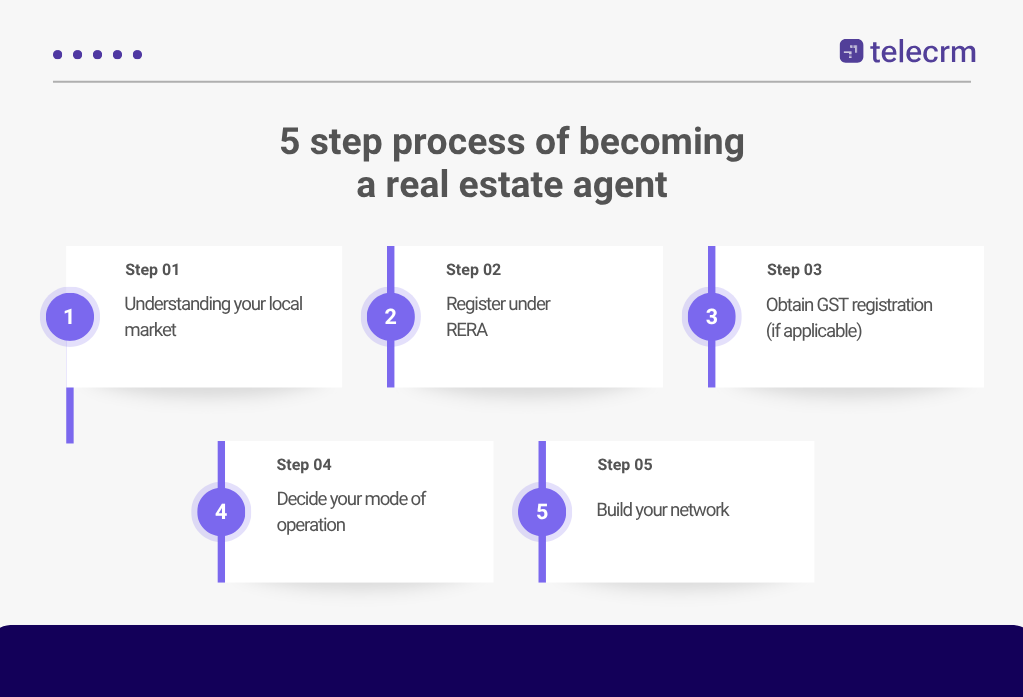
Thinking of becoming a real estate agent in India? You’re not alone. With cities growing fast and more people buying, renting or investing in property, the demand for agents is higher than ever. It seems like a good career move — flexible hours, no fixed salary cap and the freedom to work for yourself.
But it’s not as easy as just showing a few flats and collecting a commission. You need to know the rules, get registered under RERA (yes, that’s a legal requirement) and learn how to actually find and manage clients.
This guide will walk you through everything, step by step. From the basic eligibility to the paperwork you need, from how RERA works to what it costs and what it really takes to build a name in the real estate industry. Whether you want to join a real estate consultant, a real estate agency or go solo, you’ll get a clear picture of how to start and succeed as a real estate agent in India.
Just about anyone can become a real estate agent in India. There’s no formal degree or high-level qualification required. You don’t need to be from a real estate sales background or have years of experience, either. But there are a few basic requirements you must meet — and a few skills that’ll help you do well.

Here’s what you need at the very least:
In most cases, there’s no formal education requirement, though having completed the 10th or 12th standard helps with documentation and business dealings. Some states may ask for basic identification and proof of address, especially when applying for RERA registration.
Technically, yes — but it’s not called a license. You need a RERA registration certificate, which is issued by your state’s real estate authority. Without this, you cannot legally act as a broker or agent in any property deal.
You don’t need a degree, but to succeed in this line of work, these skills go a long way:
You don’t need to tick every box from day one. A lot of agents start small, learn on the job and grow with time. But having the right attitude — being honest, patient and consistent — makes all the difference.
A lot of people think being a real estate agent is just about showing houses or sharing property listings on WhatsApp. In reality, it’s much more hands-on. A good agent doesn’t just connect buyers and sellers— they guide people through one of the biggest financial decisions of their lives.
Whether you’re helping someone buy their first flat, rent a shop for their business or sell a piece of land, your job is to make the process smooth, clear and fair. And that takes work.

Here’s what you’ll actually be doing on a day-to-day basis:
You can work in different segments of the real estate market, depending on what suits you best:
Some agents work only in one area, while others handle multiple property types. Over time, you may build expertise in a specific area or type of property and that can help you grow faster.
You can either:
Both options have pros and cons. If you’re new and still learning, joining an already established business can help you learn and get started quickly. If you already know your local market and have your own contacts, going solo gives you more control and flexibility.
Becoming a real estate agent in India is straightforward, but there’s a proper process you need to follow. It’s not just about connecting buyers and sellers, you need to be legally registered, know your market and have the right documents in place. Here’s how you can proceed:

Before initiating the registration process, familiarise yourself with the real estate landscape in your area. Identify growing localities, understand property demand and get to know major builders. This knowledge will help you engage confidently with clients and establish trust.
Under the Real Estate (Regulation and Development) Act, 2016, it’s compulsory to register with your state’s RERA authority to operate legally as a property agent.
Documents typically required:
Application process:
Once approved, you’ll receive a RERA registration number and certificate, valid for five years and renewable thereafter.
If your annual turnover from brokerage services exceeds ₹20 lakh (₹10 lakh for special category states), you must register for GST. This is particularly important if you’re working with builders and charging commissions officially.
You have two primary options:
Choose the path that aligns best with your experience and resources.
Start connecting with local builders, property owners and potential clients. Most agents acquire clients through referrals, local advertisements and site visits. Utilising tools like a Customer Relationship Management (CRM) system, real estate management system or even simple spreadsheets can help you track leads and follow-ups effectively.
Note: The above information is based on the latest guidelines and may vary slightly depending on the specific requirements of different states. Always refer to your respective state’s RERA website for the most accurate and updated information.
Every state in India has its own Real Estate Regulatory Authority (RERA) and while the basic rules are the same across the country, the application process, fees and portals are different from one state to another. That means you’ll need to go through your specific state’s RERA website to register as an agent.
Here’s how it works.
Each state has its own online portal where you can:
The process is mostly online and doesn’t usually take more than 15 to 30 working days unless documents are missing or incomplete.
The registration fee differs from one state to another and depends on whether you’re registering as an individual or as a business. Here’s a rough idea:
State | Fee (Individual) | Fee (Firm/Company) |
|---|---|---|
Maharashtra | ₹10,000 | ₹1,00,000 |
Gujarat | ₹10,000 | ₹50,000 |
Karnataka | ₹25,000 | ₹2,00,000 |
Delhi (DDA RERA) | ₹5,000 | ₹10,000 |
Uttar Pradesh | ₹25,000 | ₹50,000 |
Tamil Nadu | ₹25,000 | ₹50,000 |
West Bengal | ₹10,000 | ₹50,000 |
These are approximate figures. Always check the latest fee and requirements on your state’s RERA site before applying.
Here are some direct links to help you get started:
You can also search “RERA + [your state]” on Google to find your state portal.
If you want help applying through a particular portal or understanding what a state asks for, that’s covered in the next section.
The cost of becoming a real estate agent in India is fairly reasonable compared to other professions. You don’t need a formal degree or a long course, but you do have to register yourself and stay compliant with local rules. Most of the money goes into paperwork, registration and a few basic tools to get started.
Here’s a clear breakdown of where the money usually goes:
This is the main cost, and it’s mandatory. The fee depends on two things:
As a rough estimate:
Type | Cost Range |
|---|---|
Individual registration | ₹5,000–₹25,000 |
Company/firm registration | ₹10,000–₹2,00,000 |
Always check your state’s official RERA portal for the latest and exact fees. These vary a lot and are updated from time to time.
If your annual income crosses ₹20 lakh (or ₹10 lakh in special category states), you must register for GST. This allows you to bill your clients legally and work with builders who require GST-compliant invoices.
The registration itself is free, but you may need help from a CA or consultant, which could cost ₹1,000 to ₹5,000, depending on where you live.
If you’re planning to work independently, you may need:
This cost is flexible. You can start from home or even work fully online at first. A minimal setup might cost anywhere from ₹5,000 to ₹20,000.
Some people choose to take short real estate certification courses. These are not compulsory, but may help if you’re completely new. These courses usually cover topics like legal basics, negotiation and documentation.
Typical course costs:
You can skip this step if you’re confident with self-learning or have someone guiding you.
If you’re registering as an individual and not spending on office space or a course right away, you can get started with about ₹10,000 to ₹30,000. If you’re setting up a firm or opting for courses and GST services, it could go up to ₹50,000 to ₹1,00,000 or more.
But keep in mind: unlike many other careers, most of these are one-time costs. Once you’re registered and set up, your ongoing expenses are mostly related to real estate marketing, client meetings and communication.
Getting your RERA certificate is just the first step. The real challenge is building a name for yourself in the market. There are thousands of agents out there, and the ones who succeed are the ones who do more than just share listings. They build relationships, follow up regularly and understand what people really want.
Here’s how you can grow from a new agent to a trusted name in your area:
Most people don’t buy or rent property on impulse. It’s a big decision, and they’ll only deal with someone they trust.
A few good experiences can lead to referrals, and that’s how most agents get long-term clients.
Real estate is still a very local business in India. If people see you regularly dealing in the real estate sector, like on site, near builder offices or around known properties, they’ll start recognising you.
The more visible you are, the more likely people will reach out when they need help.
Laws, prices and buyer behaviour change all the time. Make a habit of staying updated.
You don’t need to know everything, but knowing a bit more than the next person helps.
You don’t need expensive software. Even a notebook or Excel sheet works when you’re starting out. But you do need to keep track of:
As you grow, you can switch to a CRM to manage leads, calls and messages in one place.
Many agents lose clients simply because they talk in circles or use confusing words. Speak clearly, listen more than you talk and never pretend to know something you don’t.
Simple communication builds more trust than fancy language.
Pro Tip: If you are still unsure how to become a successful real estate agent in India, read our blog 10 real estate tips to learn about tricks that can help you master sales in no time
To sum it up: Real estate is about people. If you’re honest, reliable and show up when it matters, you’ll grow — no matter how crowded the market seems.
Becoming a real estate agent in India isn’t difficult, but doing it right takes effort.
You need to follow the rules, get your RERA registration sorted and understand how to work with clients. There’s no fixed path and no single way to succeed. Some agents join brokerages and learn on the job. Others go solo and figure things out as they go. Either way, it all comes down to how reliable, clear and consistent you are.
If you stay honest, build trust and actually help people through their property journey, they’ll come back to you and send others your way. That’s how you grow.
So whether you’re just exploring this as a career or ready to register today, now you know what steps to take, what to expect and how to stand out in a busy market.
Not exactly. You don’t need a “real estate agent license” in the usual sense, but you must register with your state’s RERA authority. Once approved, you get a RERA registration certificate, which legally allows you to operate as a real estate agent.
The cost of RERA registration varies by state and by whether you register as an individual or a company. It usually ranges from ₹5,000 to ₹25,000 for individuals, and ₹10,000 to ₹2,00,000 for firms. There may be other minor costs like document preparation or GST registration if applicable.
There’s no fixed salary. Most agents earn commission-based income from each deal they close. This can range from 1% to 2% of the property value for sales, and around 15 days to 1 month’s rent for rental deals. Monthly income can vary widely — from ₹15,000 to ₹2 lakh+, depending on how active and established you are.
Start by understanding your local property market and getting your RERA registration. You can either join an existing business to learn the basics or go solo if you already have contacts. From there, focus on networking, visiting new projects and building a list of leads.
It can be, but it’s not a quick or easy job. You need to put in consistent effort, follow up with clients and stay informed about your area. The flexibility, potential income and long-term growth make it a good option for people who enjoy fieldwork and talking to others. The more trust you build, the more referrals you get — and that’s where growth really happens.
Real estate agents use tools to manage leads, calls and follow-ups. One of the best options for Indian agents is Telecrm (India’s Best Real Estate CRM) — made for real estate and call-based sales. It helps you make calls, manage leads, track communications, send WhatsApp messages and follow up, all from one place.


© Copyright 2025 Telecrm.in - All Rights Reserved • Privacy Policy • T&C


© Copyright 2025 Telecrm.in - All Rights Reserved • Privacy Policy • T&C